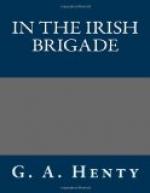A constant watch was maintained at the masthead of the ship, but no signs were seen of the English fleet, until, on the 23rd of March, six days after sailing, they reached the mouth of the Firth of Forth, and were congratulating themselves that they had brought the voyage to a successful termination.
At daybreak next morning, however, just as they were about to enter the estuary, they beheld the masts of a great fleet coming out to meet them. This was the squadron of Sir George Byng, which had for some days been on the coast, having been despatched as soon as the news reached London of the gathering of ships and troops at Dunkirk, and of the arrival of the Pretender there. The French admiral at once signalled to all the ships to put about, and he lay off until the English fleet were near enough to discern its composition, which was far superior in force to his own. Seeing the impossibility of landing the troops and stores, and the slight chances of success in giving battle, he hoisted the signal for all to make their way back to Dunkirk, keeping as much as possible together, in order to defend themselves if overtaken, or if intercepted by another hostile fleet.
In vain, James begged that a few boats might be given him, with which to land with his chief followers. The French admiral replied that his instructions would not justify him in doing so, and that he had been ordered to specially protect the person of the young king, whose safety was of the highest concern to his sovereign.
It was with the deepest feeling of disappointment, and depression, that the Scotch and Irish officers heard that it was determined to sail for Dunkirk again. Had the troops on board the ships been of their own nationality, they would have ordered them to disobey the admiral’s commands, and to insist upon the fleet, if it succeeded in evading the pursuit of the enemy, making another effort to effect a landing. As, however, all the soldiers were French, with the exception of the two or three hundred noncommissioned Irish officers, they were powerless, and were half mad with rage and grief.
“This looks bad for us,” O’Sullivan said gravely to his two friends. “I think that the French ships will outsail the English, but there is little chance that this unwieldy craft will do so; in which case, my friends, it is likely that we shall all see the inside of an English prison, and that probably not a few of us will be executed. The colonel should be safe, for he came over with the Brigade after Limerick, and therefore by that treaty was allowed to enter the service of France; but it is different with the rest of us. We have all joined since those days, and are therefore not covered by the treaty, and so are liable to be tried as traitors.”
O’Neil shrugged his shoulders.
“Well, we knew that when we joined,” he said. “However, I hardly think they are likely to proceed to such an extremity. Very many of our Brigade have been taken prisoners, at Blenheim and other places, and they have always had the same treatment as other prisoners of war.”




